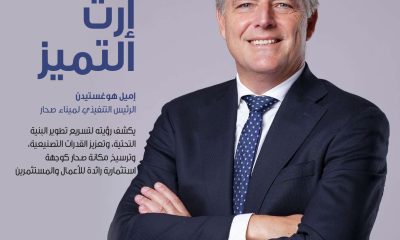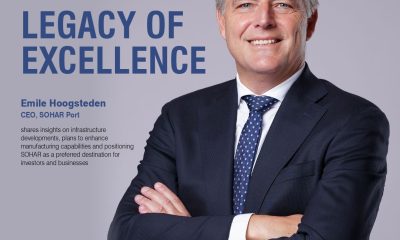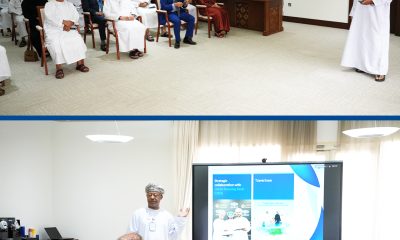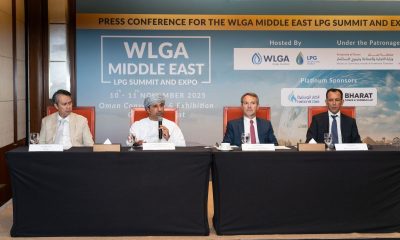Economy
CSR and education take center stage during CSR summit Oman
The CSR Oman 2015 Summit concluded its sessions successfully after various discussions, case studies and masterclasses highlighting sustainable development of SMEs, developing a future generation that is socially responsible, quantifying CSR performance and marketing it, ways to collaborate more effectively with NGOs, enhancing environmental sustainability and engaging the corporate sector through volunteering programmes.

The CSR Oman 2015 Summit concluded its sessions successfully after various discussions, case studies and masterclasses highlighting sustainable development of SMEs, developing a future generation that is socially responsible, quantifying CSR performance and marketing it, ways to collaborate more effectively with NGOs, enhancing environmental sustainability and engaging the corporate sector through volunteering programmes.
“With SMEs making up almost 90% of the business sector in Oman, it is vital that they have the needed support to thrive and play their critical role in the country’s economic and social development.” With a short yet important message the morning panel highlighted sustainable development of Small and Medium Enterprises (SMEs), featured perspectives from different stakeholders on the significance of the SMEs sector for the future of the Sultanate and way to ensure future economic sustainability through mapping key pillars for SME focused CSR programmes.
Talking about Sustainable development of SMEs, Paul Steele, Director of Training at AMIDEAST Oman, and moderator of the panel said, “The session was very useful as it spelled out the needs for CSR development in support of SMEs. We covered possible conflicts of interests between providers vs. people receiving assistance through CSR programs, and how to facilitate communication that will either eliminate conflict, or suspend conflicts in cases where they don’t exist. We also discussed the pillars of SME development, covering topics such as networking, education, technology, how they fit into the scope of CSR, and how companies can contribute. That includes providing funds and sharing resources that companies already have at their disposal. I thought these ideas were insightful for our panel to bring up.”
Commenting on whether there was a need for CSR to be introduced through school programs, he continued, “A structured education programme may not be able to keep up with what is happening in the market, in particular when we’re talking about SME’s. It would work better in a SME curriculum because SMEs are trying to access CSR funds and really what you want is to make sure that time and resources are not wasted for SMEs or CSR providers.” He added that, “Information on CSR programs would also work better as a component of an SME curriculum because SMEs can contribute CSR as well; as a way to secure and reinforce their membership to a community, and for ethical reasons as well as for marketing. Outside the scope of an SME curriculum, this kind of material might best be included in a civics or social studies class. At the college or university level I think it would make a good elective course for business related fields.”
A case study on the importance of maximizing business value through sustainable practices was led by Munther Al Busaidi, Assistant Dean for Training & Community Service, College of Economics & Political Science, Sultan Qaboos University, and Dr. Stephen Hill, Deputy Vice Chancellor at Sohar University. Number of methods and practical solutions were offered and an additional key topic on the use of CSR to invest in Oman was conducted.
Speaking on the need to boost youth development, Prof. Stephen Hill, Deputy Vice Chancellor, Sohar University on Corporate Social Responsibility and Education said, “The task of a university is to prepare students who think for themselves. We want them to think critically about all the things they get involved in, including CSR. If we can do that, we’ve done our job.” He added, “If the regulative framework is excellent, then the Corporate Social Responsibility of a company is to produce a good product that is safe and people want, a product that doesn’t do any harm. It should pay its workers and its suppliers reasonably and on time. It should abide by the regulations of the country and should not knowingly do harm.”
Developing an integrated sustainable SR model into a business’ DNA to deliver long-term benefits and quantifying the performance of a company’s suitability strategy and social impact (SROI) of its programmes were the topics of the masterclasses held in association with George Washington University, USA on the third day of the summit. Led by Faten Al Yafi, Center for Sustainability and Excellence (CSE) Expert, Consultant Managing Director and Founder of Fatina Al Yafi Consultancy; and Shaima Al Lawati, Founding Partner of Sustainable Square Oman, the masterclasses managed to share detailed steps on how to develop, integrate, and execute CSR strategies as well as methods of evaluating the social and business impact of sustainability programmes.
Paul Hilder, Director at The British Council said, “The British Council is very pleased to be supporting this event, particularly on the theme of CSR and education. We are very interested in working in partnership with companies and the Ministry of Education to complement and enhance the educational curriculum in Oman, focusing on how can we produce graduates who are CSR savvy, but also, on the other hand, the use of CSR to support education. From both angles, it’s been a very interesting conversation so far.”
The CSR Oman Summit 2015 was supported by Oman LNG, British Council, DUQM Refinery, and WorleyParsons.
Please like OER’s page on Facebook so that you get all our articles and others may find us.
-

 Alamaliktistaad Magazines2 months ago
Alamaliktistaad Magazines2 months agoAlam Al Iktisaad – September 2025 Edition
-

 Magazines2 months ago
Magazines2 months agoOER – September 2025 Issue
-

 News2 months ago
News2 months agoKitchenomiKs Secures Investment of US$3.2M Led by Jasoor Ventures
-

 News2 months ago
News2 months agoOman Inaugurates ‘Hadatha’ – Its All-New Cybersecurity Center
-

 Banking & Finance2 months ago
Banking & Finance2 months agoOman Arab Bank Highlights Its Ongoing Strategic Initiatives and Future Plans
-

 News2 months ago
News2 months agoIEA Expects Global Oil Market to Remain Oversupplied in 2026
-

 Energy2 months ago
Energy2 months agoWLGA Middle East LPG Summit & Expo 2025 to be held at OCEC on November 10 and 11
-

 Real Estate2 months ago
Real Estate2 months agoAl Mouj Muscat Unveils Azura Beach Residences Phase 2: A New Chapter in Waterfront Living































You must be logged in to post a comment Login